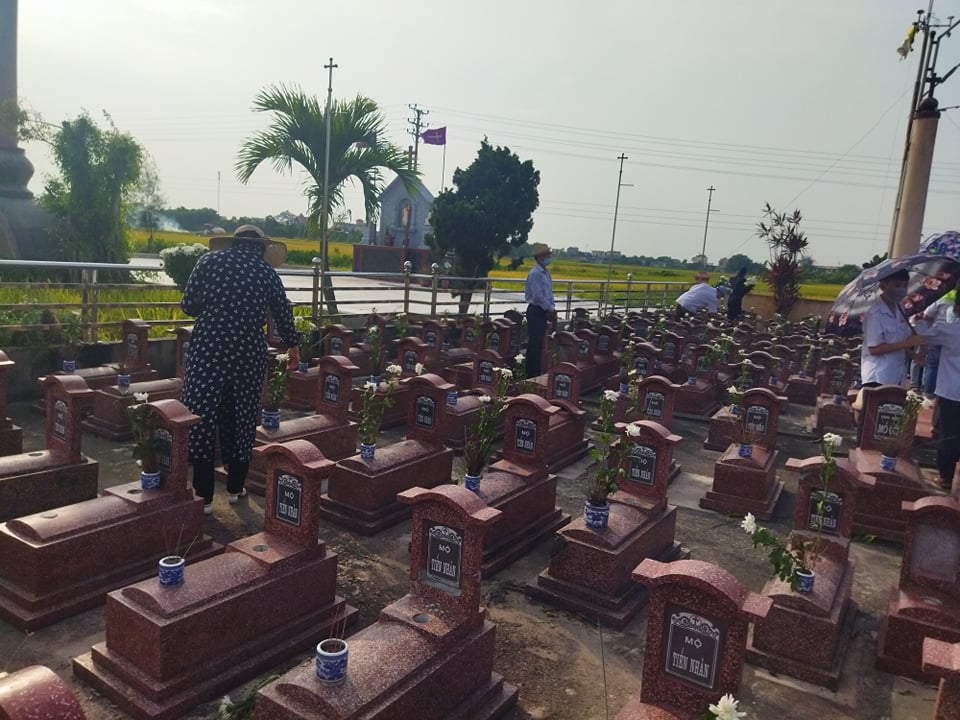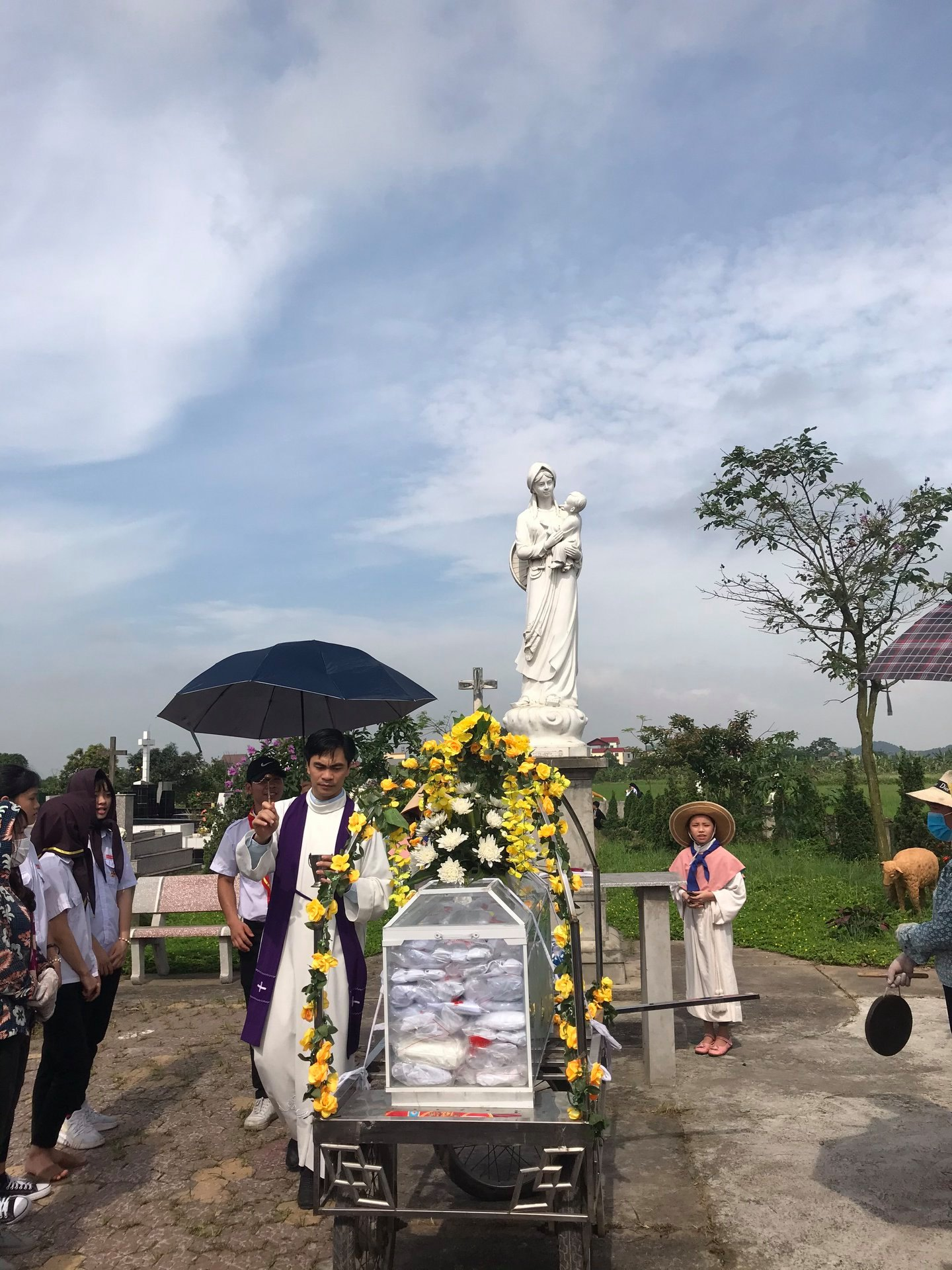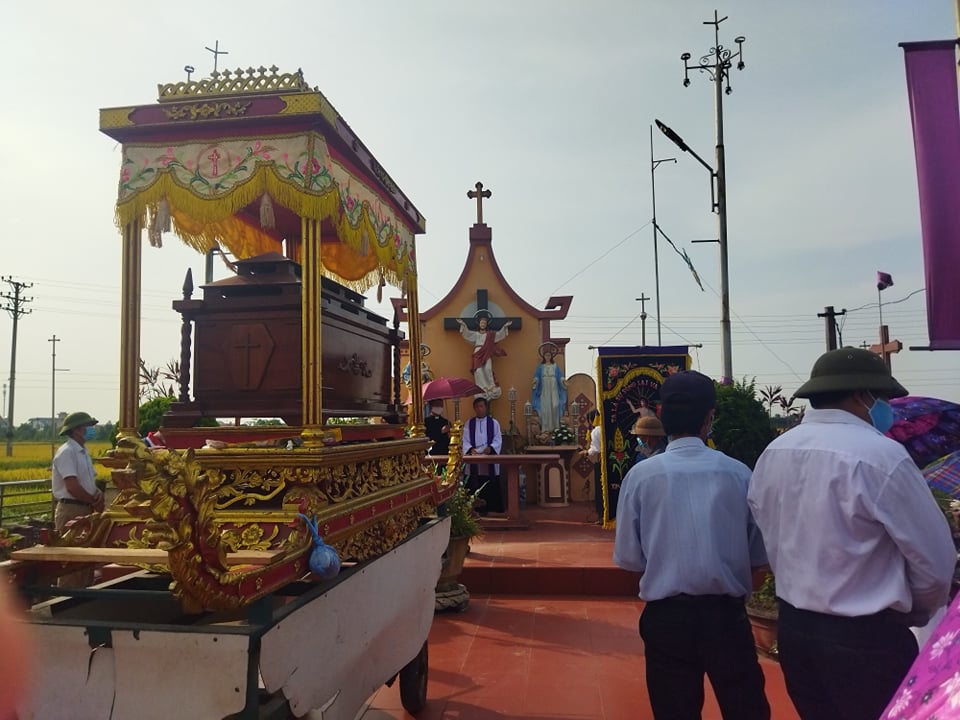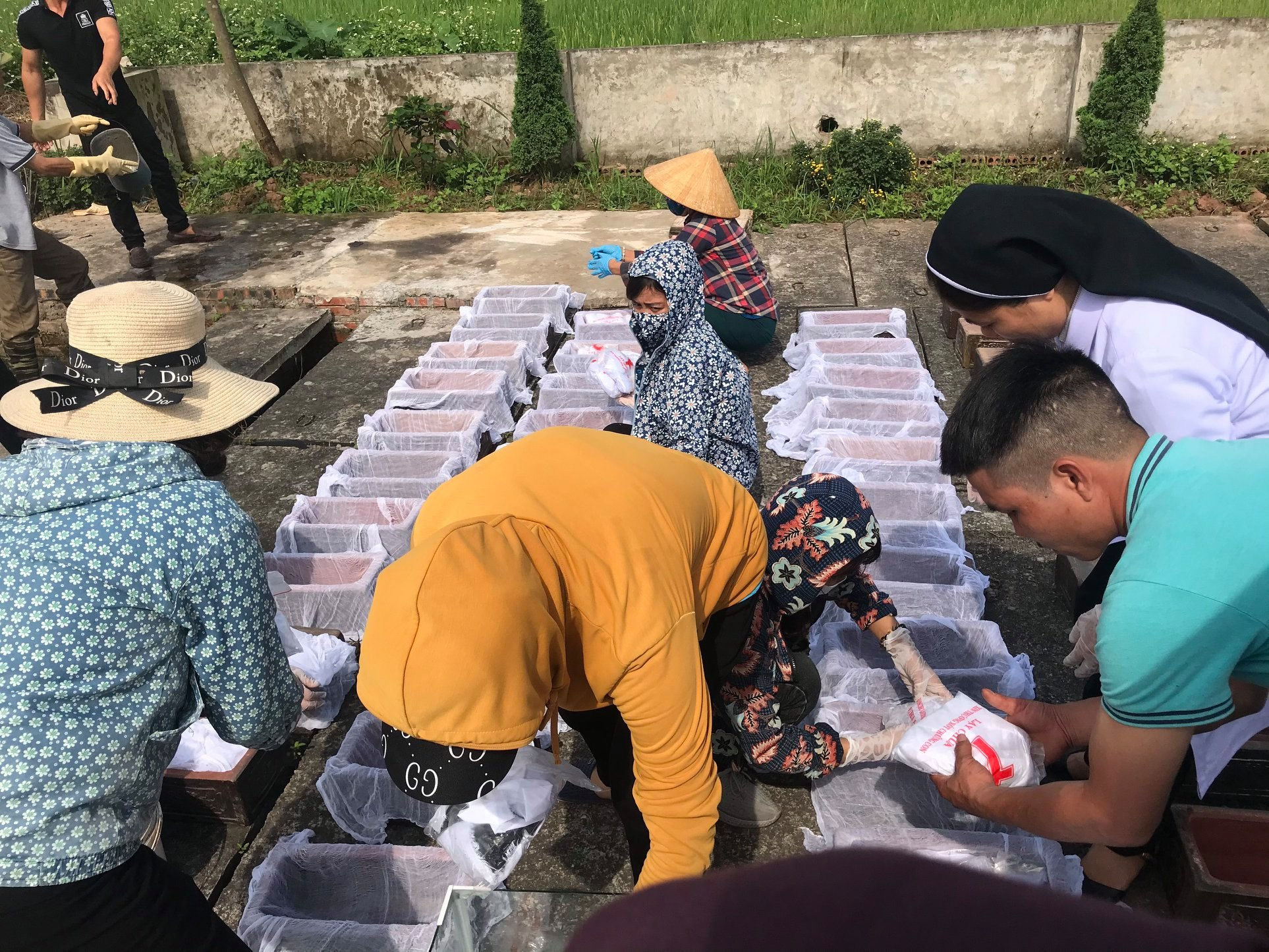Nguyen Khac Toan has been collecting fetal remains from hospitals and clinics for the past four years. He goes by Min Hun on Facebook and TikTok, sharing graphic videos and images of his work along with his phone number. Toan says he is available to provide free fetus rescues and burials in the country’s capital, Hanoi.
The young man, who started burying aborted fetuses as a 16-year-old, shares videos of his attempts to resuscitate fetuses, something he told the Globe he has done successfully many times. They show Toan with a fetus resting on his knees inside a black plastic bag while he presses two fingers against a tiny chest, stoops over to perform mouth to mouth, or flicks the bottom of feet. The seemingly impossible feat is all the more improbable given his lack of medical training.
“I breathed to save the baby’s life. I found it at the abortion clinic,” he told the Globe in response to a recent video he posted where he is seen supposedly resuscitating a fetus that was aborted at 35 weeks. In the post that received over a thousand likes, photos show a healthy baby smiling in the arms of adoptive parents. Toan did not provide the Globe a means to contact the parents, nor additional proof of the baby’s origin.
“I want to do this job because I love unborn babies and the most important thing I want is to spread the word for everyone to come together to condemn abortion,” Toan said.
Although representing an extreme end of the spectrum, individuals like Toan and other anti-abortion groups showcase the conflicting place that abortion services hold in Vietnamese society. Despite having the most liberal abortion laws in the region and the highest abortion rates in Asia, social stigma is pervasive towards the termination of pregnancies.
Regardless of the well-established legality of abortion, there are issues regarding safety, access, the treatment of women seeking the service, as well as a lack of sexual education and post-abortion counselling. These factors contribute to the high number of unwanted pregnancies, with abortions long serving as a band-aid for a lack of sexual health services in Vietnam.
Toan is far from alone in his stance on abortion or in his efforts to bury fetuses. Anti-abortion groups – mainly Catholic but also including Buddhist and non-denominational organisations – across Vietnam have been reported to collect what are often referred to as “unborn babies” from hospitals and clinics to bury in cemeteries created for that purpose.
In Hanoi, a cemetery in Soc Son District held 90,000 aborted fetuses as of 2016. Home to 45,000 graves as of 2013, Catholics made a similar cemetery for fetal remains in Vietnam’s former ancient capital Hue. In the central city of Pleiku, there is a cemetery which reportedly held 19,000 fetuses as of 2016. Moving to the southeastern city of Bien Hoa, a Catholic priest established a cemetery in 2011 described as the “eternal resting place of more than 46,000 unborn babies.”
Meanwhile, Le Ha Ngan of Caritas Bac Ninh, the province’s Catholic diocese, told the Globe the organisation has operated a cemetery for fetal remains since 2010 and has buried more than 10,000 fetuses in the province. Caritas has 26 locations spread across 12 provinces and, according to Ngan, has connections to medical centres that contact the group when they have fetal tissue ready to be picked up.
“They will call or text me to come pick up the baby,” Ngan said. “Then we keep [the fetuses] frozen at the church or the manor house.”
Activities such as these are often characterised by the media as good deeds and the individuals who gather and bury fetal remains as righteous humanitarians. But abortion policy professionals such as Nguyen Thi Bich Hang, country director of MSI Reproductive Choices in Vietnam, question how the practice is even possible. Hang told the Globe the management of medical waste would usually forbid this seemingly easy access and that, to her, the idea of groups collecting fetal tissue discarded on the street or directly from hospitals seems unlikely.
“I heard a story about some young people who actually pick up the fetus in the garbage … I am very skeptical about this,” she said. “Among the network of our clinics, they all have contracts with waste management.”
Still, existing regulations in Vietnam about the management of waste – medical or not – frequently go without enforcement. Such gaps could leave openings for providers to abandon fetal tissues improperly on the street or hand them over to burial organisations either as a means of cost-cutting on disposal bills or even sympathy with the anti-abortion cause.
Le Hoang Minh Son, co-founder of Vietnam Youth Action for Choice, a member of the Asia Safe Abortion Partnership, told the Globe that, despite its prevalence, abortion is still a taboo topic in Vietnam and sympathy for anti-abortion groups not uncommon.
“There’s a stigma against abortions. People don’t like abortion and people don’t want to talk about it. People hate it. People also hate women who have abortions,” he said. “Every time we talk about abortions people will link it with murder, like killing a person.”

Inidividuals like Toan and the groups that present their work burying fetuses as a charitable activity offer a glimpse into a radical outlook on a more widespread understanding of abortion as a shameful practice in Vietnam.
This issue was again brought to the forefront in late May of this year when a news report claimed police were investigating 1,300 dead “newborns” found frozen in an apartment in Hanoi. Images show a group of masked police officers huddled over the contents of the freezers, a collection of plastic containers holding fetal remains. According to the report, no criminal activity was found as the bodies had been collected by a charity and were being stored until they could be taken for burial.
The group which claims responsibility for this action is a Christian charity that goes by Nhóm Bảo Vệ Sự Sống, or Protect Life Group. With more than 130,000 followers on its fanpage, the charity is lauded for its activities by netizens who praise such work as distributing food to the poor in Ho Chi Minh City, the locked-down epicentre of the current Covid-19 outbreak.
In a recent drive, the food is gathered in large cardboard boxes labelled with the group’s signature logo: a tiny fetus curled inside a heart with wings attached to its back and a cross hovering above its head.
Offering a higher number than that reported in May’s news reports, a member of the group told the Globe about the “1,443 babies” they had collected and stored in a Hanoi apartment.
“In Vietnam, the right to life of unborn babies is not protected,” a Vietnamese woman who goes by Eirlys Jenn and is a member of Protect Life said. “But you know, we are only human and everything is managed by the [Communist] Party and government authorities.”
Post-independence, the Catholic church in Vietnam has had a contentious relationship with the government, often centered around land disputes.

“That’s why our work of collecting fetuses is not public, but must be done in secret,” Jenn said.
Although according to Jenn, Ho Chi Minh City has no large cemeteries akin to those found in the north, Protect Life sends the fetuses collected in the city to District 3’s Ky Dong Church, a Redemptorist Catholic church, for funeral rites. According to a post about the church from a local funeral business, the cemetery at Nhà Thờ Kỳ Đồng collects an average of 10 fetuses each week.
“We will collect and store the children in the freezer. We will bury them once a month. There are many places for burial,” Jenn said of Protect Life’s activities in the North. “Some months are only about 200 babies, but some months will be more than 1,000. Months like that are usually the month after Valentine’s Day or the holidays.”
First legalised in 1945 after Vietnam gained independence from the French, abortion became gradually more common in the years after. In the 1960s, abortion became legal up to 22 weeks of pregnancy, which remains the case today.
In the 1980s, the socialist government adopted a two-child policy to curb population growth in an attempt to improve the economic conditions of its citizenry and bring women into the workforce. When the Law on Protection of People’s Health was approved in 1989, birth control and abortions were provided free of charge to married women.
Today, although no longer free of charge, abortion services are still widely available at public hospitals and private clinics. A 2014 Hanoi Central Obstetrics Hospital survey found that at that time 40% of pregnancies in Vietnam ended in termination, producing an average of 2.5 abortions per woman nationally. Though reliable comparisons are hard to come by, by one anti-abortion NGOs estimates this placed Vietnam 13th highest globally in terms of abortion rates, in a list largely populated by European and North American countries.
Considering that data from private clinics is not collected in Vietnam, the study confirmed that abortion rates are significantly higher than what is publicly reported.
“There’s a big gap between the reported statistics on abortion in Vietnam in comparison with the reality,” said Hang of MSI.
“Some years ago, the WHO indicated 1.5 million abortion cases in Vietnam, and out of that 30% actually occured among young people under 18. But, because of the lack of the systematic reporting on abortion in Vietnam … the unofficial number, it’s many times higher.”
The bleach on the cannula would go into the uterus, and you know, the lining of the uterus is very sensitive and that kind of bleach could actually cause a scar on the uterus
Hang believes Vietnam’s high levels of abortions are part of a wider public health issue. Problems still exist in regards to the safety of terminating a pregnancy, and the high rates showcase an unmet needs for comprehensive sexual education and post-abortion counselling.
Hang saw firsthand the issues regarding the safety of abortions while doing training with a clinic as part of MSI’s private social-franchise. During a visit to the clinic with a monitor for MSI’s London office, Hang and her colleague observed that a single tool, a cannula, was soaked in a bleach solution and used for multiple surgical abortions.
“The bleach on the cannula would go into the uterus, and you know, the lining of the uterus is very sensitive and that kind of bleach could actually cause a scar on the uterus,” said Hang. “With the uterus having a scar, there is almost no chance of conception.”
In addition to this, Hang saw that the same syringe was being used multiple times while practitioners performed abortions. These unsafe practices can spread diseases, including HIV.
“It takes us a lot of effort and time to really correct that and monitor it. Certainly that situation goes beyond the knowledge of the women. I mean, how can women know whether an abortion is safe or unsafe? It all depends on the service provider.”

While issues with abortion care pose concerns, the road that leads so many Vietnamese women and girls to these practitioners is another problem. A lack of sexual education and stigma toward pre-marital sex leaves many young and unmarried individuals vulnerable to unwanted pregnancies.
“We have the compulsory lesson about reproduction and puberty for junior high and high school students, but my experience and also my experience of talking to young people, is that the teachers usually skip that lesson,” said Son, of the Vietnam Youth Action for Choice.
When contraception is discussed, Son continued, it is taught as something to do after marriage.
Annie Hoang, who received a grant to research youth experiences in accessing sexual healthcare in Ho Chi Minh City in 2014, also found that marital status often led to preferential treatment among subjects at Hung Vuong Hospital, the second-largest public obstetrics and gynaecology speciality hospital in the city.
As Hoang described, besides facing “universal patronisation and condescension” while getting an abortion, unmarried women were also less likely to be offered services such as cervical cancer screenings or contraceptive counselling.
Although Hoang reported that receiving an abortion at the hospital was easy, Son of the abortion rights group has found otherwise, noting that young women are often denied service at public hospitals. This would force them to turn to private clinics which are not publicly monitored for safety standards and are more expensive.
“I will say two-thirds of the cases got turned away,” Son said. “The attitudes of the health providers are really cruel and they are kind of aggressive. … They blame the women because they don’t know how to control their sexual decisions so that’s why they end up having unwanted pregnancies.”
They sent me home after the day under morphine when I could barely walk … I can’t imagine if you don’t have the means to find yourself some support or if you don’t have any
Back at Hung Vuong Hospital, Hoang found a near-total lack of post-abortion counselling.
In the ward of the hospital that Hoang did her research, there was a single unmarked room dedicated to post-abortion counselling. Women were not directed to this room nor given any information about it.
“Sometimes I actually had to literally take the hands of my interviewee who really wanted to know, and take them to this unmarked, kind of vague room where I knew the counseling happens.”
Poor to zero post-abortion counselling is not limited to public hospitals. A French national described to the Globe how she did not receive any pre- or post-abortion counselling when she went to get an abortion earlier this year at Saigon’s FV Hospital, a large facility which boasts international-quality healthcare.
Besides the lack of counselling, she underwent an uncommonly painful procedure for a medical abortion in the early stages of gestation which left her in pain for a month. While the procedure was easily accessible, she said there was virtually no support provided afterward.
“They sent me home after the day under morphine when I could barely walk,” she said. “I can’t imagine if you don’t have the means to find yourself some support or if you don’t have any.”
Potentially dangerous experiences such as this tie into what experts such as Hang say are part of a much longer road to providing all women in Vietnam with access to safe abortions and sexual healthcare.
Without ready access to less-invasive forms of contraceptives or even education about safer practices, Vietnam’s high abortion rates may continue to be a major feature in the national healthcare landscape – especially as the ongoing Covid-19 outbreak shuts down the availability of vital services.
“It is a little bit overwhelming to talk about this because the unmet need is huge,” Hang said.


